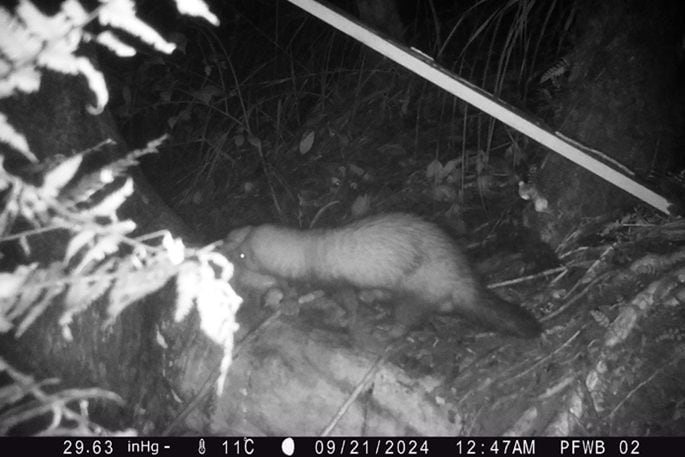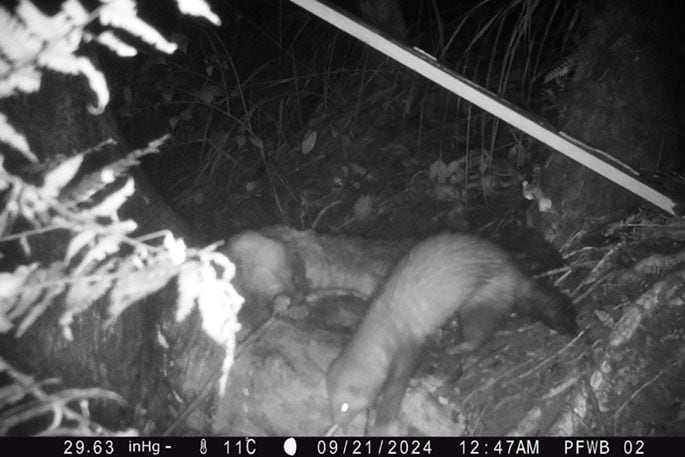A large ferret measuring over half a metre in length, nicknamed ‘Goliath,’ has been spotted on the prowl in the Orokawa Bay area, heightening concerns for the protection of local wildlife. Photo/Predator Free Waihī Beach.
A large ferret nicknamed ‘Goliath,’ has been spotted on the prowl in the Orokawa Bay area, heightening concerns for the protection of local wildlife.
Measuring over half a metre in length, Goliath is posing a significant threat to the native bird species that inhabit this vital ecosystem.
Ferrets are notorious for their nocturnal hunting habits and can cover vast territories, often decimating local bird populations. The presence of ferrets has also been linked to the extinction of several bird species, including the kākāpō.
Lyla Hudson, a volunteer with Predator Free Waihī Beach, emphasised the gravity of the situation. “This isn’t just a rumour; Goliath is a very real danger to our precious ecosystem,” Hudson said.
Her concerns were echoed by local resident Vicki McFarlane, who recently had a startling encounter with the ferret.
“I was sitting down for a cup of tea when this giant ferret appeared at my patio door,” McFarlane said.
“It was a real shock, and then it ran off into the garden. This creature is big enough to do serious damage to our wildlife.”

A large ferret measuring over half a metre in length, nicknamed 'Goliath,' has been spotted on the prowl in the Orokawa Bay area, heightening concerns for the protection of local wildlife. Photo/Predator Free Waihī Beach.
Efforts to trap Goliath have faced setbacks, particularly due to the presence of dogs on the Orokawa Track, where the regulations prohibit pets in order to protect the wildlife.
Despite these rules, Predator Free Waihi Beach Coordinator Susan Lean said some visitors continue to bring their dogs, disrupting traps by consuming lures and leaving behind scents that deter Goliath from entering.
This has led to the loss of over 100 volunteer hours, as a recent camera trap revealed a black Labrador with a yellow collar eating a rabbit carcass near one of the carefully placed traps for Goliath.
“We’ve had so much community buy in. Residents and visitors can play a crucial role in protecting Orokawa’s wildlife by observing track regulations and spreading awareness,” Lean said.
Orokawa Bay is home to a variety of endangered species, including kākā, bellbirds, little blue penguins, and the morepork (rūrū).
Many of these birds nest on the ground or in tree cavities, making them especially vulnerable to predation.
The local community is being urged to respect wildlife protection measures and to spread awareness about the importance of keeping dogs off the track.
“We really need the help of the community to keep the Orokawa Track clear of dogs,” Lean said. “A friendly reminder to those bringing dogs onto the track can go a long way in ensuring compliance and aiding in our conservation efforts.”
Residents and visitors can play an important role in the conservation effort by staying informed and following the regulations designed to protect the area’s fragile ecosystem.
For more information or to report sightings of Goliath, people are encouraged to contact Susan Lean at predatorfreewaihibeach@gmail.com.
The Waihī Beach community is united in its mission to preserve the natural heritage of Orokawa Bay and ensure that future generations can continue to enjoy its unique wildlife.



0 comments
Leave a Comment
You must be logged in to make a comment.